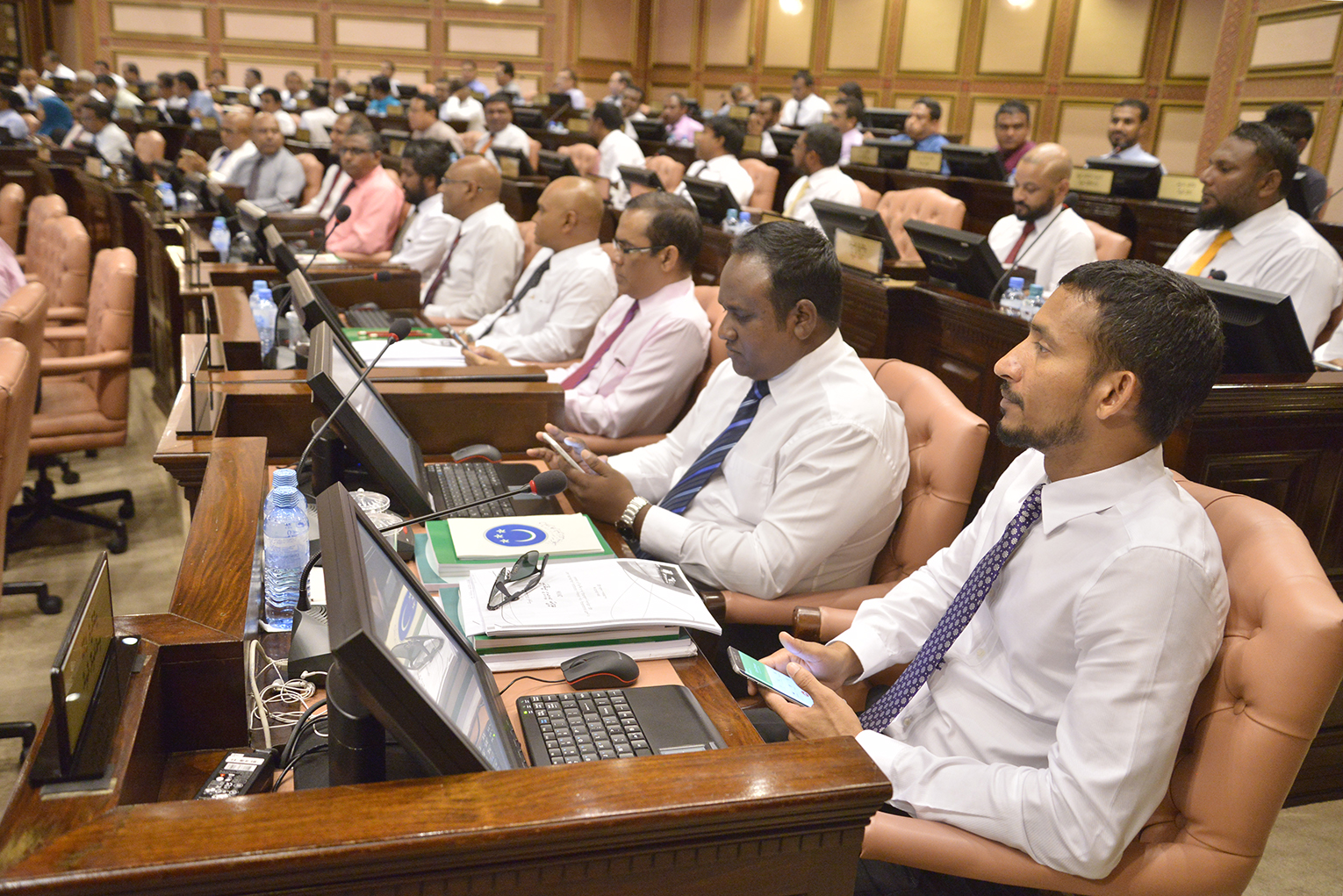The ruling party-dominated parliament on Monday pushed through controversial changes to the rules of procedure to require a minimum of 42 signatures from the 85-member house to submit a no-confidence motion against the speaker or the deputy speaker.
The move came a day after the opposition coalition submitted a second no-confidence motion with 31 signatures to remove Speaker Abdulla Maseeh Mohamed. An impeachment vote against Deputy Speaker ‘Reeko’ Moosa Manik was also due to take place on Tuesday.
After the rules change was approved with 46 votes from ruling coalition lawmakers, Maseeh announced that both no-confidence motions have been “invalidated in line with the amended regulation”.
MPs from the opposition coalition boycotted the vote in protest, calling the changes “arbitrary and unconstitutional” as the speaker can be removed with fewer than 42 votes if the attendance is low.
“The [President Abdulla] Yameen faction’s behaviour in parliament demonstrates the panic measures the president is willing to undertake in order to try and maintain his increasingly precarious grip on the legislature,” the opposition alliance said in a joint statement.
“President’s Yameen’s actions are a contemptible attempt to further erode the separation of powers by undermining the independence and effectiveness of the legislature. With these underhand tactics, President Yameen has shown, once again, that he is prepared to subvert the institutions of state to maintain his increasingly fragile and illegitimate hold on power.”
The changes were approved by the general affairs committee on Sunday evening, hours after the opposition resubmitted the motion to remove Maseeh, and states that it will apply retroactively.
The rules previously required 15 signatures to move a motion of no-confidence against the speaker or deputy speaker. The constitution states that a motion to impeach the president can be submitted with signatures from one-third of members or at least 29 MPs.
Immediately after Monday’s sitting, the opposition coalition announced that it will re-submit the no-confidence motion against Maseeh with 42 signatures.
“Whether we believe it or not, they have brought an unconstitutional change to the parliament regulations. We have acted in accordance with the regulations. We will continue to abide by the laws and regulations,” Minority Leader Ibrahim Mohamed Solih told reporters outside the parliament building.
During the debate at Monday’s sitting, Majority Leader Ahmed Nihan said the ruling coalition sought the changes to save parliament’s time by ensuring that the opposition cannot submit no-confidence motions despite lacking a majority.
“The amendment to the parliament regulation is necessary for the interest of the people. This is an amendment of the national colours of green, red and white,” said the parliamentary group leader of the ruling Progressive Party of Maldives.
“We are not doing anything new. Why don’t they submit the motion with 42 signatures? They are only trying to halt development programmes. We are doing what we are obliged to do,” PPM MP Ali Arif insisted.
Nihan told the press on Sunday that the opposition’s aim with the no-confidence motions was instability and political turmoil.
“We have finished formulating a vaccine to tackle this flu. We will use this vaccine. Hopefully, this flu, this illness will not affect us for the rest of the year when we are immunised,” he said.
Opposition MPs meanwhile objected to the police’s refusal to allow Jumhooree Party leader Gasim Ibrahim to attend Monday’s sitting. The Majlis rules or standing orders state that a lawmaker detained over an alleged offence must be brought to sittings and committee meetings.
But Maseeh rejected a motion without notice submitted by JP MP Abdulla Riyaz calling for a debate on the issue, insisting that it was not filed in accordance with the rules.
The opposition’s previous bid to impeach Maseeh last month was defeated after 13 MPs were forcibly expelled from the chamber and 48 ruling coalition lawmakers declared support for the speaker in a controversial roll call vote.
The opposition alliance cried foul and western democracies expressed concern with “irregularities” but the government insisted that the vote was “free, fair, and transparent.”




















